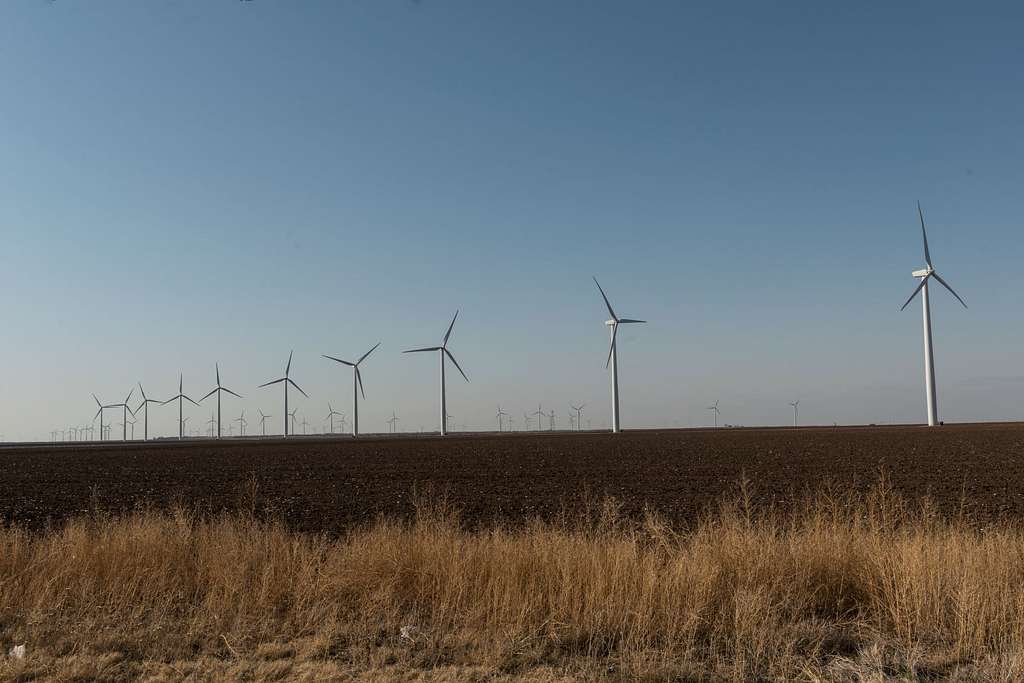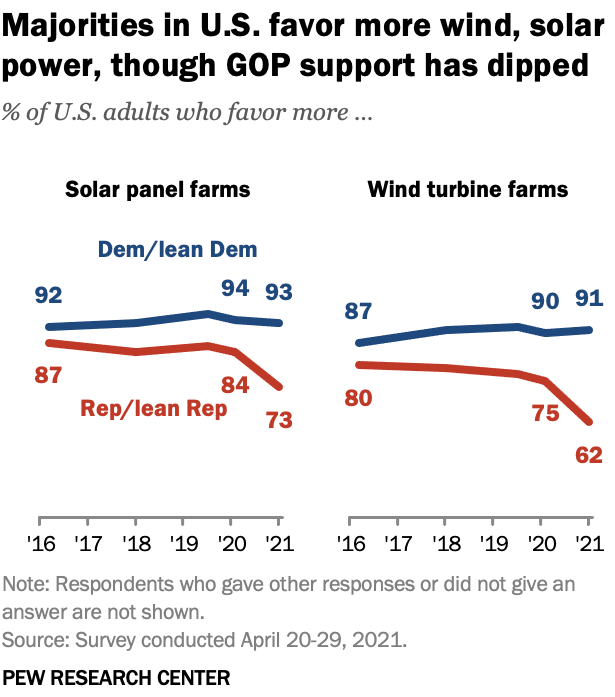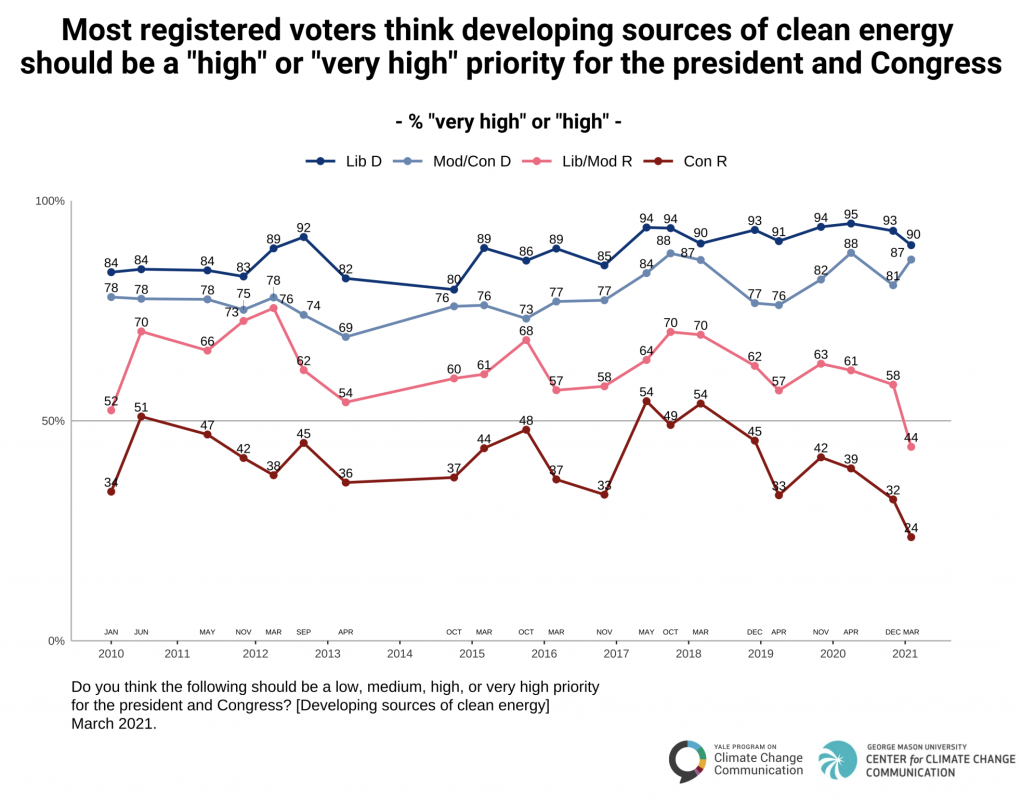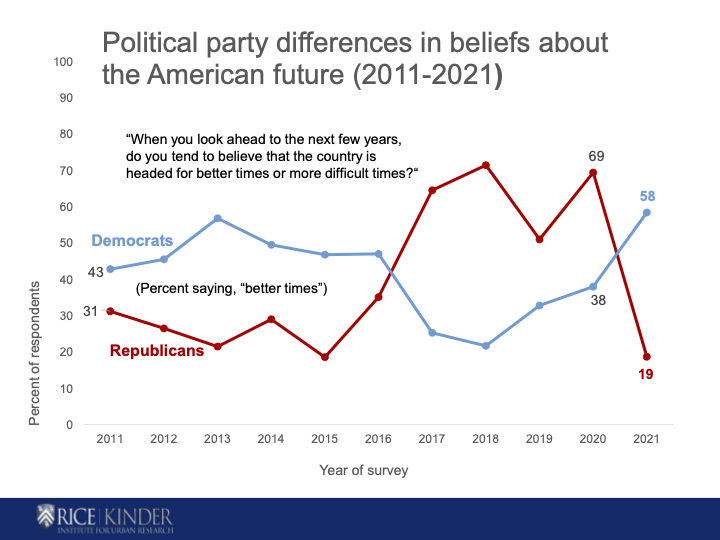
Wind farm near Snyder in Scurry County in west-central Texas. The Lyda Hill Texas Collection of Photographs in Carol M. Highsmith’s America Project, Library of Congress, Prints and Photographs Division, via PICRYL
Polls showing Republicans’ lack of concern about climate change and opposition to actions explicitly labeled as ways to fight it have typically come with an important asterisk: Many still supported renewable energy.
That last part might be changing.
Now, with a Democrat in the White House promoting renewable power, two recent national surveys show Republican enthusiasm for renewables has declined notably over the past year. The results represent yet another possible sign of growing partisan polarization, in this case on already divisive climate-related issues.
The Pew Research Center asked U.S. adults in April if they favored expanding wind and solar energy and measured an abrupt drop since 2020:
Among Republicans and Republican-leaning independents, support for increasing reliance on solar power is down from 84% last year to 73% today, while support for more wind power dropped from 75% in 2020 to 62% today. Around nine-in-ten Democrats and Democratic-leaning independents continue to support expanding solar (93%) and wind power (91%).
The partisan gaps on expanding solar (20 percentage points) and wind power (29 points) are now larger than at any point since the Center started asking about these energy sources in 2016.

Pew Research Center
A similar finding emerged from a poll conducted in March by opinion researchers at Yale and George Mason universities. They asked if developing clean energy sources should be a “high” or “very high priority” for the president and Congress:
About nine in ten liberal Democrats (90%) and moderate/conservative Democrats (87%), and about half of Independents (51%) think developing sources of clean energy should be a high or very high priority for the president and Congress. About four in ten liberal/moderate Republicans (44%) and one in four conservative Republicans (24%) think so.
Over the past year, there has been a sharp decline in the percentages of both liberal/moderate Republicans and conservative Republicans who think developing sources of clean energy should be a priority for the president and Congress. The current numbers are all-time lows since we first asked the question in 2010.

Yale Program on Climate Change Communication, George Mason University Center for Climate Change Communication
Texas Climate News asked Anthony Leiserowitz, director of the Yale program that collaborates on Yale-George Mason polls about climate issues, why he thinks opinion researchers have just recorded such steep declines in Republic support for renewables. He replied:
We’re doing a deeper analysis now, but I suspect at least three things led to the most recent drop: One, the Texas freeze happened just a few weeks before this survey. Two, Republican leaders (and others) blamed renewables for the debacle. A lie, but they repeated it over and over and over again in their media ecosystem;. Three, we see in this data that Republicans who are more frequent watchers of Fox News prioritize clean energy far less than their fellow Republicans who don’t watch Fox News.
So basically, I suspect we’re looking at the combination of “political elite cues” and conservative media ecosystem effects amplifying anti-clean energy messaging – very similar to what we found they did to the Green New Deal.
TCN also asked Rice University political scientist Mark P. Jones for his reaction to the two polls’ results on renewables. Jones is the fellow in political science at Rice’s Baker Institute for Public Policy and a political science professor. His response:
Renewable energy has become ensnared by the growing partisan polarization in the United States, with support for renewable energy increasingly associated with the Democratic Party. This association with Democrats has in turn resulted in a decline in support among Republicans and Republican leaning independents for renewable energy in general, and for specific forms of renewable energy such as wind and solar in particular.
At the same time, the trend toward greater support for renewable energy has increased among Democrats, given the twin forces of greater awareness of the negative consequences of climate change combined with growing unanimity within the Democratic Party in support of renewable energy.
This partisan divide is especially strong in those states where the oil, natural gas, and/or coal industries are a major source of jobs, such as Texas, Pennsylvania, North Dakota, Wyoming, Louisiana, New Mexico, Alaska and West Virginia.
Another source of this opposition stems from the dependence of the renewable energy industry on federal subsidies, which in turn are funded by tax revenue, which in turn are paid by tax payers, which generates opposition from free-market oriented Republicans who believe energy use should be left primarily to market forces rather than government intervention.
General evidence of the “growing partisan polarization in the U.S.” that Jones described was present in the most recent Kinder Houston Area Survey, conducted annually since 1982 by opinion researchers at Rice.
In the latest edition of the Houston poll, conducted between January and March and released in May, the gap between Democrats and Republicans had grown since last year to 39 percentage points on the question of whether respondents “believe that the country is headed for better times.”
Stephen Klineberg, an emeritus professor of sociology at Rice who founded the Houston Area Survey, said that this finding demonstrates a “remarkable polarization in outlooks on the American future after the 2020 election.”

Rice University Kinder Institute for Urban Research
Bill Dawson is the editor of Texas Climate News.
